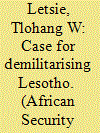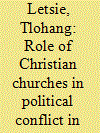| Srl | Item |
| 1 |
ID:
165767


|
|
|
|
|
| Summary/Abstract |
The Kingdom of Lesotho spends around five per cent of its annual budget – some 700 million Maloti ($US52.6 million) in 2017 – on the Lesotho Defence Force (LDF). Lesotho’s geographical position means that the LDF has no meaningful role regarding its primary function of defending the country from external aggression and it hardly engages in its secondary functions. In addition, the LDF has a long history of interference with democratic processes and engaging in human rights abuse. The financial resources currently allocated to the LDF could do far more for security, widely defined, if they were allocated to a number of other government expenditure categories.
|
|
|
|
|
|
|
|
|
|
|
|
|
|
|
|
| 2 |
ID:
176732


|
|
|
|
|
| Summary/Abstract |
Lesotho has a poverty rate above 50%, this renders a bulk of households connected to the grid unable to purchase enough energy to cover the essential basic needs at the current tariffs. This is supported by the declining average household consumption reported by Lesotho Electricity Company (LEC) despite an increasing customer base. Even more crucial, for low income countries, tariff levels should balance social stability, affordability, fairness, energy efficiency as well as cost recovery especially because the poor make up the majority of the population. Based on the poverty line, a lifeline tariff of 0.5 to 0.6 Maloti(M)/kWh (2017 tariffs) for a threshold of up to 30 kWh/month is proposed which is 35%–42% lower than the current domestic tariff of 1.424 M/kWh. The standard domestic tariff will need to increase to 1.856 M/kWh to allow for cross-subsidisation and hence maintain the financial standing of the utility company. The threshold capacity is based on the observation that in 2016, around 30% of grid connected households consumed less than 30 kWh/month which is enough electricity to cover the basic needs of an average household. Hence, an increasing block tariff (IBT) approach is proposed such that the first 30 kWh/month are set at a lifeline tariff and any excess is charged at a standard rate which is set such that it cross-subsidises the lifeline tariff.
|
|
|
|
|
|
|
|
|
|
|
|
|
|
|
|
| 3 |
ID:
103053


|
|
|
| 4 |
ID:
153647


|
|
|
|
|
| Summary/Abstract |
Political unrest in 2014 threatened Lesotho’s newly found democratic stability. Observers focus on educating the public about the electoral system and encouraging pre-election coalition discussions. However, this analysis suggests that such remedies ignore the institutional influences of Lesotho’s electoral system that undermine both public understanding and stability. Furthermore, a statistical analysis of district competition finds the 2015 elections to be largely consistent with previous elections, but that the percentage of rejected ballots correlates with a district victory for the largest party. Although this may simply be a statistical anomaly, the findings highlight structural challenges and reconsideration of electoral reforms.
|
|
|
|
|
|
|
|
|
|
|
|
|
|
|
|
| 5 |
ID:
137202


|
|
|
|
|
| Summary/Abstract |
This paper examines the role played by Christian churches in political conflict in Lesotho. It argues that Christianity has played changing roles in the conflict that has characterised Lesotho's politics since 1970. At first, the two largest Christian denominations – the Roman Catholic Church (RCC) and the Lesotho Evangelical Church (LEC) – were associated with the rival Basotho National Party and Basutoland Congress Party (and its offshoots) respectively. The differences between the two denominations trickled down and became a source or intensifier of political conflict. All this happened while the leadership of the two churches worked together, amid high mistrust, within the Christian Council of Lesotho. The political polarity between the ‘Congress’ and the ‘Nationalist’ streams subsided with the splits within the Congress parties and subsequent formation of new parties. On the other hand, mistrust between the leadership of the RCC and the LEC subsided following a change of leadership in the two churches, together with one in the Anglican Church of Lesotho in the first decade of the 21st century. Following these developments, there ceased to be a link between Christian denominations and political conflict in the country. The Christian churches have recently become the most reliable mediators in political conflict.
|
|
|
|
|
|
|
|
|
|
|
|
|
|
|
|
| 6 |
ID:
145966


|
|
|
|
|
| Summary/Abstract |
This paper assesses the role of the non-farm sector in rural development in Lesotho. Evidence from studies in developing countries indicates that agriculture was formerly used as the main source of livelihood for many people in poor countries. However, due to the decline in agricultural productivity (which results in poverty and food insecurity) caused by unfavourable agro-climatic conditions, many people are turning to non-farm activities as a means of making a living. Therefore, non-farm incomes are used to provide the means of sustenance for many people. However, little attention has hitherto been paid to improving the rural non-farm sector as an alternative or complementary rural development strategy in Lesotho. This research paper uses quantitative research methods to analyse the available data. The main research findings suggest that many people make a living out of non-farm incomes. As a result, this paper proposes that the rural non-farm sector should be given more priority by the government in rural development in Lesotho.
|
|
|
|
|
|
|
|
|
|
|
|
|
|
|
|